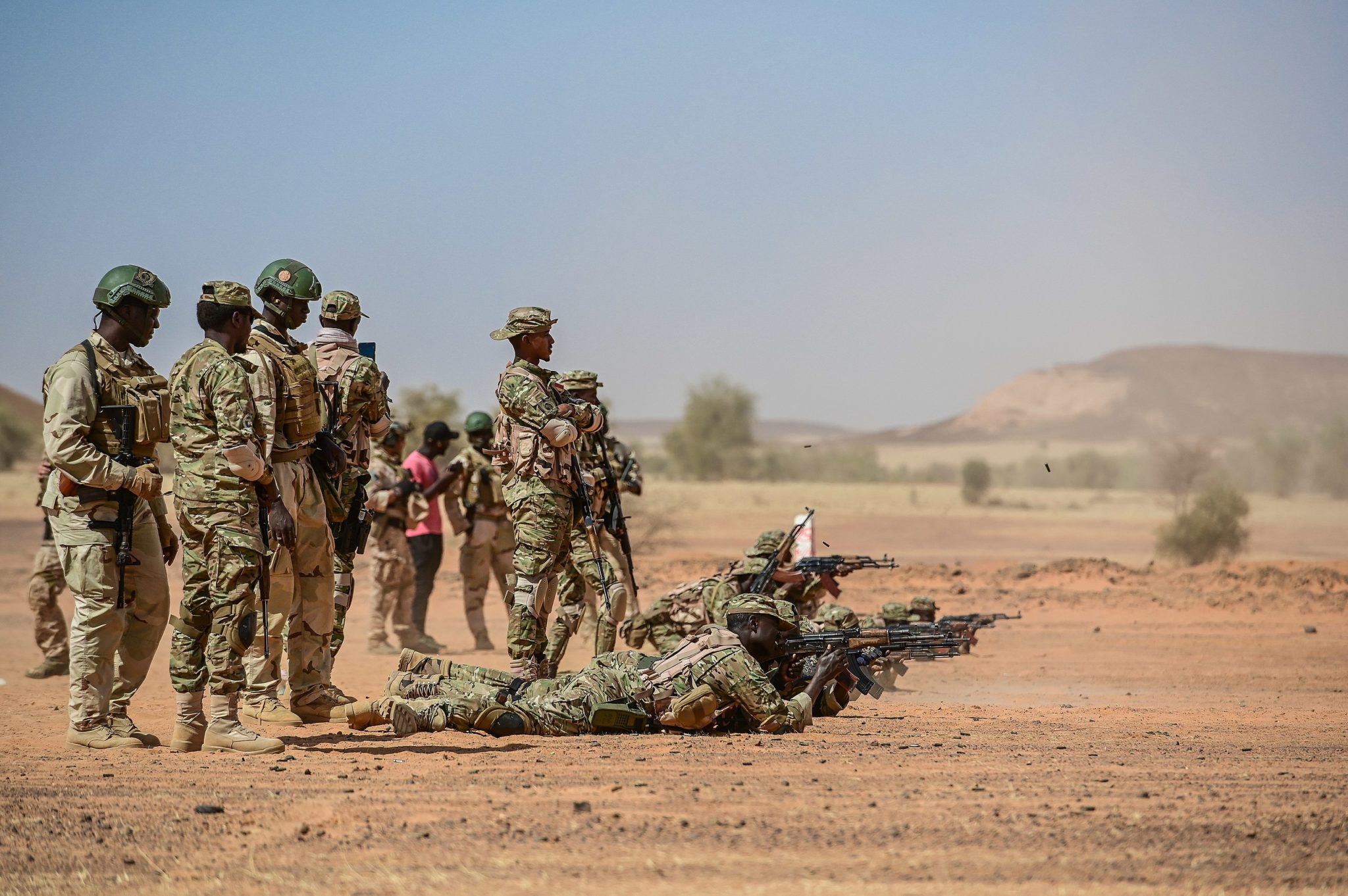
Trigger time at Flintlock 20.
“The operations conducted by MNJTF have seriously degraded the insurgents and there is, therefore, the need to bring all resources together to completely defeat the BHT/ISWAP.”
On 30 November, the business-oriented Lagos-based publication The Nation reported in the excerpted article on Nigerian president Muhammadu Buhari’s speech to heads of state of Multinational Joint Task Force (MNJTF) countries, which include Nigeria, Niger, Chad, Cameroon, and Benin.[i] Buhari argued for greater financial and political commitment to enable the MNJTF to defeat Boko Haram. Prior to Buhari’s speech, on 25 September, the southern Nigeria-based publication This Day, which often reports critically on northern Nigerian affairs, featured the second excerpted article that highlighted the importance the Nigerian army is placing on the MNJTF to combat Boko Haram. According to the article, Nigerian Brigadier General Abdulsallam Abubakar visited the MNJTF headquarters in Chad and, like Buhari, stated that the MNJTF was degrading Boko Haram but additional resources would be needed to finish the job. In particular, Abubakar pointed to the increasing operational tempo against Boko Haram, which comprises two factions around Lake Chad whose mobile bases were largely dismantled during a Chadian-led operation in 2019.[ii]
Although there are other security challenges facing Nigeria, such as banditry and cross-border trafficking, which were the MNJTF mandates when it formed in the 1990s, Buhari urged the MNJTF countries to continue to primarily focus on combatting Boko Haram. This has been the top priority for the MNJTF since Boko Haram launched its insurgency in 2010. The MNJTF was most effective in combating Boko Haram in 2015, but it has since suffered from a lack of coordination, if not also unity of purpose and sufficient resourcing. Ultimately, results will need to be seen on the battlefield in future MNJTF confrontations with Boko Haram along Lake Chad’s shorelines for Buhari’s and Abubakar’s statements to be validated. Their statements nevertheless demonstrate that Nigeria is not conducting a go-it-alone strategy against Boko Haram. Rather, the country considers the contributions of neighboring countries—and specifically the MNJTF—crucial to the military effort.[iii]
Sources:
“Boko Haram: Buhari urges MNJTF to exert final push to end terrorism,” thenationonline.ng (business-oriented Lagos-based daily newspaper), 30 November 2022. https://thenationonlineng.net/boko-haram-buhari-urges-mnjtf-to-exert-final-push-to-end-terrorism/
President Muhammadu Buhari yesterday urged the Multinational Joint Task Force (MNJTF) in the Lake Chad Basin to exert the final push towards ending terrorism in the region. The President said this in his opening address at the 16th summit of the Heads of State and Government of the Lake Chad Basin Commission (LCBC) at the Conference Hall of the Presidential Villa in Abuja. President Buhari, who ended his tenure as chairman of the commission at the end of the 16th summit, also charged his colleagues from the other five member-countries of to provide the requisite political and material support for the LCBC/MNJTF in order to motivate the formations to deliver on their mandates.
President Buhari noted that the fight against Boko Haram terrorists and other forms of threats in the region must remain the lead priority.
“MNJTF Seeks Joint Resource Pool to End Boko Haram, ISWAP Menace,” thisdailylive.com (independent Lagos-based daily newspaper), 25 September 2022. https://www.thisdaylive.com/index.php/2022/09/25/mnjtf-seeks-joint-resource-pool-to-end-boko-haram-iswap-menace/
The Force Commander of the Multinational Joint Task Force (MNJTF), Maj. Gen. Abdul Ibrahim, yesterday called on stakeholders to mobilise resources to bring to an end the menace posed by terror groups, Boko Haram and the Islamic State in West African Province (ISWAP) in Nigeria and the Lake Chad region. The Force Commander spoke as the Chief of Defence Staff (CDS), Gen. Lucky Irabor, said joint training of the armed forces was crucial in dealing with security challenges afflicting the nation…. Speaking in Chad, the Force Commander, MNJTF stated that to effectively bring hostilities in the region to an end and “completely wipe out Boko Haram and ISWAP terrorists in Nigeria and the Lake Chad region,” all stakeholders must pool resources to contain insurgency. He said so far the operations conducted by MNJTF had significantly degraded the insurgents….“The operations conducted by MNJTF and Operation Hadin Kai have seriously degraded the insurgents and there is, therefore, the need to bring all resources together to completely defeat the BHT/ISWAP,” he said.
Director of Army Affairs, Ministry of Defence, Mr. Sunday Attah, affirmed that “the objective of the competition, which is to reinforce the existing cordial working relationship between members of the Armed Forces, has been achieved.”
Notes:
[i] The MNJTF, which is based in N’Djamena, Chad, was originally based in Baga, Nigeria until Boko Haram overran the military base there in 2015. Considering that Boko Haram has gained strength since 2015, the MNJTF is generally not regarded as having succeeded despite winning several battles with the group. In particular, it has been hampered by distrust between the member states. See Albert, Isaac Olawale. “Security Regimes in Africa – Prospects and Challenges.” Africa Development, Vol. 42, No. 3. 2017, pp. 119-135.
[ii] Chad launched Operation Bohoma Wrath against Boko Haram after the terrorist group, led by Abubakar Shekau, massacred roughly 90 Chadian soldiers in the town of Bohoma along the Lake Chad shoreline in a surprise raid in early 2020. For additional information see: United Nations S/2020/373 Security Council, “Joint Force of the Group of Five for the Sahel: Report of the Secretary-General,” May 8, 2020. https://digitallibrary.un.org/record/3861622?ln=fr
[iii] A book chapter on the MNJTF notes that the four MNJTF countries besides Nigeria are incentivized to participate in military operations against Boko Haram to build their own military capacities by receiving training and weapons from foreign armies. In this regard, these countries have tended to seek only limited engagements with Boko Haram on Nigerian territory, but still just enough to assure that the capacity-building of their armies continues. See Emmanuel, Nikolas. “External Incentives and the African Subregional Response to Boko Haram.” African Border Disorders, 1st ed., vol. 1, Routledge, 2018, pp. 136–50. https://doi.org/10.4324/9781315166483-7
Image Information:
Image: Trigger time at Flintlock 20
Source: USAFRICOM from Stuttgart, Germany, https://commons.wikimedia.org/wiki/File:Trigger_time_at_Flintlock_20_(50111204252).jpg
Attribution: CC x 2.0
